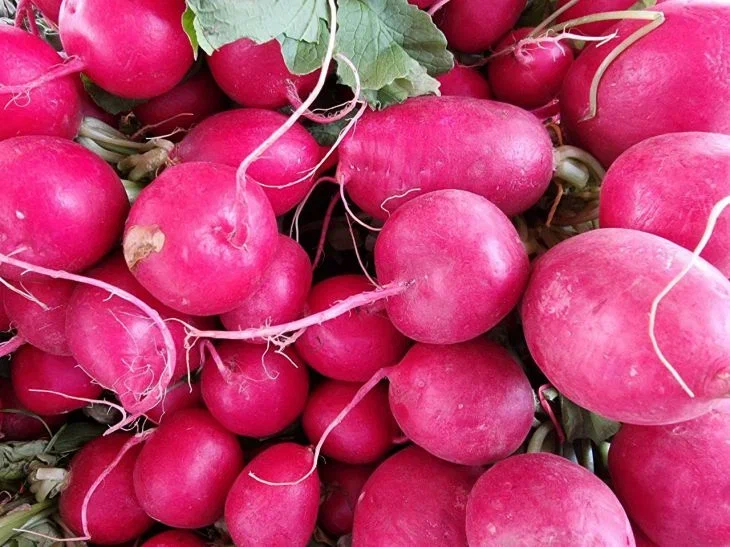Almost everyone is familiar with this small red vegetable with a bitter taste since childhood.
Yes, we are talking about the beloved radish. It is a very healthy product that can be eaten in its pure form, added to salads and even canned for the winter.
But what are its benefits and what is the secret of its enormous popularity?
The positive effects of radish on the body, as well as contraindications to its use, will be discussed below.
Compound
The beneficial properties of radish are due to its rich composition. It contains all the vitamins and minerals necessary to enrich every cell of the body.

The product composition is formed by:
• ascorbic acid;
• essential oils;
• proteins;
• riboflavin;
• thiamine;
• pyridoxine;
• cobalamin;
• nicotinic acid.
It is noteworthy that the tops of the vegetable are more useful than the root vegetable itself.
It contains much more vitamins, so it is thrown away completely unjustifiably. Few people use it in cooking, and very much in vain.
Beneficial properties
The benefits of radish for the body are enormous, so it should not be underestimated. Thus, its use is recommended for people:
• with obesity;
• cardiovascular pathologies;
• metabolic disorders;
• low stomach acidity;
• hypercholesterolemia;
• atherosclerosis;
• decreased intestinal peristalsis.
And this healthy red vegetable helps to solve many other problems.
Now about the effect of the components of radish on the body. They contribute to:
• elimination of the inflammatory process;
• splitting of subcutaneous fat;
• preventing the formation of atherosclerotic plaques.
Radish is good for blood vessels not only because of its ability to fight harmful cholesterol. Thanks to vitamin C, which is part of its composition, you can strengthen the vascular walls, thereby making them less brittle and more stable.
The vegetable is also useful for the immune system. It contains a whole complex of necessary substances that strengthen the body's defenses. Due to this, with regular consumption of the product, the frequency of colds and many other diseases decreases.
In recent years, researchers have begun to study another property of radish. More precisely, not the radish itself, but the coloring pigment that is part of it and gives it such a color.
Who shouldn't eat radishes?
Despite the benefits of radish, in some cases it is prohibited to eat it. The reason for this is the spiciness of the product.
So, adding radishes to food is not recommended for people:
• with gastric lesions;
• diseases of the pancreas;
• intestinal dysfunction;
• liver diseases;
• lesions of the gallbladder.
Another serious contraindication to the use of radishes is thyroid disease.
The vegetable can provoke a deterioration of the condition, and in some cases can even cause the development of goiter. But in this case, we are talking about eating radishes raw.
To avoid negative consequences, people with thyroid disease are advised to boil the root vegetable well before eating it.
Earlier we talked about why you need to take a milk bath .








